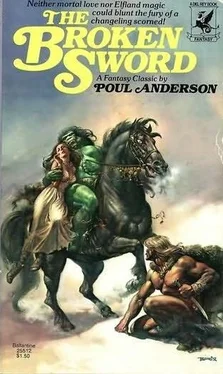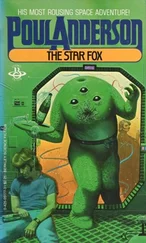Poul Anderson - The Broken Sword
Здесь есть возможность читать онлайн «Poul Anderson - The Broken Sword» весь текст электронной книги совершенно бесплатно (целиком полную версию без сокращений). В некоторых случаях можно слушать аудио, скачать через торрент в формате fb2 и присутствует краткое содержание. Жанр: Фэнтези, на английском языке. Описание произведения, (предисловие) а так же отзывы посетителей доступны на портале библиотеки ЛибКат.
- Название:The Broken Sword
- Автор:
- Жанр:
- Год:неизвестен
- ISBN:нет данных
- Рейтинг книги:3 / 5. Голосов: 1
-
Избранное:Добавить в избранное
- Отзывы:
-
Ваша оценка:
- 60
- 1
- 2
- 3
- 4
- 5
The Broken Sword: краткое содержание, описание и аннотация
Предлагаем к чтению аннотацию, описание, краткое содержание или предисловие (зависит от того, что написал сам автор книги «The Broken Sword»). Если вы не нашли необходимую информацию о книге — напишите в комментариях, мы постараемся отыскать её.
The Broken Sword — читать онлайн бесплатно полную книгу (весь текст) целиком
Ниже представлен текст книги, разбитый по страницам. Система сохранения места последней прочитанной страницы, позволяет с удобством читать онлайн бесплатно книгу «The Broken Sword», без необходимости каждый раз заново искать на чём Вы остановились. Поставьте закладку, и сможете в любой момент перейти на страницу, на которой закончили чтение.
Интервал:
Закладка:
Now the forging went apace, sparks flew and metal shouted. Such was the skill of those smiths that it was only a short while before Skafloc wore winged helm, shining byrnie, shield on back and sword at side and axe in hand, all of blue-gleaming steel. He yelled for joy, swung high his weapons and shrilled the war-cry of the elves.
“Ha!” he shouted as he rammed the sword back into its sheath. “Let trolls or goblins, aye, giants dare approach Alfheim! We shall smite them like the lightning and carry the fire into their own lands!” And he made the staves:
Swiftly goes the sword-play singing in the mountains. Clash of steel is calling, danging up to heaven:—arrows flying angry; axes lifting skyward, banging down on byrnies, breaking shields and helmets. Swiftly goes the sword-play: Spears on hosts are raining; men run forth in madness, mowing ranks of foemen; battle tumult bellows; blood is red on axeheads; greedily the grey wolf gorges with the raven.
“Well spoken, IS a trifle boyish,” said Imric coolly, “but remember not to touch elves with those new toys of yours. Let us begone.” He gave Motsognir a sack of gold. “Here is payment for the work.”
“Rather had I been paid by the freeing of your thralls of our race,” said the dwarf.
“They are too useful,” declared Imric, and left.
At dawn his troop sheltered in a cave, and the next night rode on to the great forest in which stood the Elfking’s castle.
Here was a weaving of witchery that Skafloc did not yet know how to unravel. He was dimly aware of high slender towers against the moon, of a blue twilight wherein many stars wavered and danced, of a music which pierced flesh and bone to thrill in the very soul; but not until they were in the throne room could he clearly see anything.
Surrounded by his tall lords, in a throne of shadow sat the .Elfking. Golden were his crown and sceptre, and his robes of a purple that blent with the spacious gloaming. His hair and beard were white, and he alone of the elves showed lines of age in brow and cheeks. His face was otherwise as if carved in marble; but fires burned within his eyes.
Imric bowed, and the warriors in his train bent the knee to their King. When the ruler spoke, it was like windsong: “Greeting, Imric, earl of Britain’s elves.”
“Greeting, lord,” answered the chieftain, and he met the Elfking’s calm, terrible gaze.
“We have summoned our chieftains to council,” said the ruler, “since word has reached us that the trolls make ready to go to war again. It cannot be doubted ’tis us they arm against, and we may look for the truce to end in the next few years.”
“That is well, lord. Our swords were mouldering in the scabbards.”
“It may not be so well, Imric. Last time the elves drove back the trolls and would have entered their land had not peace been made. Illrede Troll-King is no fool. He would not attempt war did he not think he was stronger than formerly.”
“I will ready my domain, lord, and send out spies.”
“Good. Perhaps they can learn something useful, though our own have failed.” Now the Elfking turned his eyes on Skafloc, who grew cold about the heart however boldly he confronted that flame of a gaze. “We have heard tell of your changeling, Imric,” he murmured. “You should have asked us.”
“There was no time, lord,” argued the earl. “The babe would be baptized ere I could get word here and back. Hard is it to steal a child these days.”
“And risky too, Imric.”
“Aye, lord, but worth it. I need not remind you that humans can do much which is barred to elf, troll, goblin or the like. They may use every metal, they may touch holy water and walk on holy ground and speak the name of the new god—aye, the old gods themselves must flee some things which humans have the freedom of. We elves need such a one.”
“The changeling you left in his place could do all that.”
“Indeed, lord. But you know the wild and evil nature of a half-breed like that. He cannot be trusted with magic as this human can. Were it not that men must never be sure their children are stolen, so that they would call their gods to avenge them, elves would make no changelings.”
Thus far the talk had been of what everybody understood, in the leisured manner of immortals. But now the Elfking’s tone sharpened. “Can this human be trusted? Let him but turn to the new god and he is beyond our reach. Already he grows perhaps overly strong.”
“No, lord!” Skafloc stood forth in that proud assembly and looked straight into the Elfking’s face. “I am wholly thankful to Imric that he rescued me from the dullblind round of mortal life. I am elf in all but blood, it was elf breasts I suckled as a babe and elf tongue I speak and elf girls I sleep beside.” He lifted his head, almost arrogantly. “Give me leave, lord, and I will be the best of your hounds—but if a dog be driven out, he will become a wolf and feed on his master’s flocks.”
Some of the elves were aghast at this forwardness, but the king nodded, and smiled a grim smile. “We believe you,” he said, “and indeed earlier men adopted into Alfheim proved stout warriors. What worries us about you is the story of the Aisir’s naming-gift. They have a hand in this somewhere, and their purpose is not likely to be our own.”
A shudder ran around the gathering and some made rune signs in the air. But Imric said: “Lord, what the Norns have ordered, not even the gods may alter. And I would count it shame to lose the most promising of men because of a dun fear of the morrow.”
“That it would be,” nodded the Elfking, and the council turned itself to other things.
A lavish feast was held ere the meeting of the elf lords dissolved. Skafloc’s head swam with the magnificence of the Elfking’s court. When finally he came home, his contempt and pity for humans were so great that for a while he had naught whatsoever to do with them.
Now some half-dozen years went by. The elves showed no change, but Skafloc grew until his outfit had to be altered by Imric’s dwarf thralls. He came to stand taller and broader than the earl, and was the strongest man in the realm. He wrestled bears and wild bulls, and often ran down a stag on foot. No other in Alfheim could have bent his bow or handily swung his axe, whether or not it was of iron.
He grew leaner of face, and let a moustache the wheaten colour of his long hair grow on his lip. But he became, if anything, merrier and more unruly than before, a lover of madcap pranks and breakneck stunts, a mischievous warlock who would raise a whirlwind just to lift a girl’s skirt, a mighty drinker and brawler. Restless with his own strength, he prowled the land, hunting the most dangerous game he could find. Monsters of the blood of Grendel he sought out and slew in their fens, sometimes suffering frightful wounds which only Imric’s magic could heal, but ever ready for a new bout. Then again he might lie idle for weeks on end, staring dreamily at clouds high above, scarce stirring himself. Or in beast shape, with senses strange to man, he would seek forests and waters, to gambol as otter or lope as wolf or wing in the pride of an eagle. “Three things have I never known,” he boasted once. “Fear, and defeat, and love-sickness.”
Imric regarded him strangely. “Young are you,” he said, “not to have known the three ultimates of human life.”
“I am more elf than human, foster father.”
“So you are—as yet.”
One year Imric outfitted a dozen longships and went a-roving. The fleet crossed the eastern sea, and plundered goblins dwelling along the rocky coasts. Then the crews rode inland and made a raid on a troll town, burning it after they had slain its folk and taken their treasures. Though war was still not declared, such forays and tests of strength were growing common on either side. Sailing north and then east through a weird white land of mist and cold and drifting icebergs, Imric and Skafloc and their warriors at last rounded a cape, passed through a strait, and went on south. There they fought dragons, and harried among the demons of the land. They followed the shore westward again, until it turned south, and then northward anew. Their hardest battle was on a desert strand with a troop of exiled gods, grown thin and shrunken and mad in their loneliness but wielding fearsome powers even so. Three elf ships were burned after the fight, there being none left to man them, but Imric was the victor.
Читать дальшеИнтервал:
Закладка:
Похожие книги на «The Broken Sword»
Представляем Вашему вниманию похожие книги на «The Broken Sword» списком для выбора. Мы отобрали схожую по названию и смыслу литературу в надежде предоставить читателям больше вариантов отыскать новые, интересные, ещё непрочитанные произведения.
Обсуждение, отзывы о книге «The Broken Sword» и просто собственные мнения читателей. Оставьте ваши комментарии, напишите, что Вы думаете о произведении, его смысле или главных героях. Укажите что конкретно понравилось, а что нет, и почему Вы так считаете.











